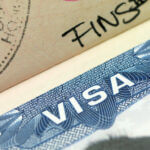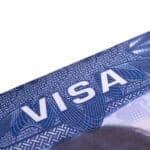Contents
- 1. Failing to Prepare
- 2. Not Dressing Appropriately
- 3. Being Late
- 4. Providing Incomplete or Inaccurate Information
- 5. Appearing Nervous or Agitated
- 6. Not Understanding the Interviewer’s Questions
- 7. Bringing Prohibited Items
- 8. Not Demonstrating Ties to Your Home Country
- 9. Not Being Polite and Courteous
- 10. Assuming the Consular Officer Speaks Your Language
The United States is one of the most sought-after destinations for international travelers. Whether you’re planning a vacation or moving to the country for work or study, obtaining a visa is often a crucial step in the process. And for many people, the most daunting part of the visa application process is the interview at the US embassy.
In this blog post, we’ll highlight 10 common mistakes people make during their visa interview at the US embassy.
1. Failing to Prepare
One of the biggest mistakes people make is not preparing adequately for the interview. This can include not researching the type of visa you need, not knowing the purpose of your visit, and not having the necessary documentation, not purchasing a return ticket (or at least have a plan to return home). It’s important to read up on the visa application process and requirements well in advance of your interview and collect all possible evidence to prove you qualify for the visa thought.
2. Not Dressing Appropriately
First impressions matter, and the way you dress for your visa interview can make a big difference. It’s important to dress professionally and conservatively, as you would for a job interview. Business casual is also possible if done tastefully.
3. Being Late
Arriving late to your visa interview can be a major red flag for the consular officer. Make sure to arrive at the embassy with plenty of time to spare, as there may be security checks and other procedures to go through before your interview. Plan to arrive at least 30 minutes before your scheduled interview time.
Also check the security alerts and other regulations the night before your interview as there maybe additional requirements like not allowing cell phones and car key or liquids to bring with you to the embassy building. Also, make sure you have the current address and know which entrance is open for interview
entry.
4. Providing Incomplete or Inaccurate Information
One of the most important things to remember during your visa interview is to be honest and transparent. Providing incomplete or inaccurate information can lead to your visa being denied, and could even result in a permanent ban from entering the U.S.
Make sure to fill out your visa application completely and truthfully, and bring all necessary documentation to your interview. Remember, you may not be able to tell your story during the interview so it is prudent to put as much information about the reason for your trip and why you qualify to receive it into the open space were it asks for purpose of your trip.
5. Appearing Nervous or Agitated
It’s natural to feel nervous during your visa interview, but try to remain calm and composed. Avoid appearing agitated or defensive, as this can make you seem suspicious to the consular officer. Speak clearly and confidently, and answer all questions asked and be short and concise with your answers. Remember, giving more information than asked may lead to more questions or give wrong impression or be mis-interpreted.
6. Not Understanding the Interviewer’s Questions
Make sure to listen carefully to the questions the consular officer asks you during your interview. If you don’t understand a question, don’t be afraid to ask for clarification.
It’s better to ask for clarification than to provide an incorrect or incomplete answer. Listen to the full question, take a breath, and only then answer.
7. Bringing Prohibited Items
The US embassy may have strict rules regarding what you can bring with you to your visa interview. Make sure to read up on these rules beforehand and avoid bringing any prohibited items, such as electronic devices or large bags. If you’re not sure if an item is allowed, err on the side of caution and leave it at home. Recheck the information right before you are
going to the interview as rules are subject to change frequently.
8. Not Demonstrating Ties to Your Home Country
The consular officer will want to know that you have strong ties to your home country, such as a job, family, or property. If you can’t demonstrate these ties, the consular officer may suspect that you have intentions of staying in the US beyond the duration of your visa.
Make sure to bring documentation that demonstrates your ties to your home country such as children’s birth certificates, marriage certificate, work letter confirmation, proof of approval from the employer for taking vacation from work, medical appointments scheduled after your return, Etc.
9. Not Being Polite and Courteous
During your visa interview, it’s important to be polite and courteous to the consular officer. Avoid being confrontational or argumentative, even if you disagree with a question or decision. Remember, the consular officer has the final say on whether to approve your visa or not.
10. Assuming the Consular Officer Speaks Your Language
Finally, it’s important to remember that the consular officer may not speak your native language. So get your documents translated and bring a translator if you don’t speak English and/or the language of the country where your interview is taking place.






